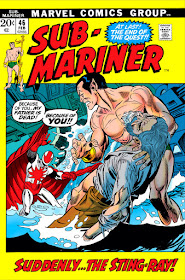From a period of eleven months during 1993-94, you may remember a crossover event which took its lead from the pages of Mighty Thor and essentially had the Thunder God decimating a number of high-profile opponents in a fit of madness and rage which, if unchecked, would have him seeking the destruction of the entire universe, including his homeland of Asgard. Aptly named "Blood and Thunder," the storyline would also serve the purpose of drawing readers' attention to five other titles to which it had a connection, specifically:

- Silver Surfer #s 86-88
- The Warlock Chronicles #s 6-8
- Warlock and the Infinity Watch #s 23-25
- The Infinity Crusade
- As well as, for the sake of accuracy,
- Thunderstrike
The Infinity Crusade, of course, being a crossover event in itself, capitalizing on its 1991-92 predecessors The Infinity Gauntlet and The Infinity War, with this new series perhaps being the first (and only?) time two crossover events have *ahem* "crossed" paths at the same point in time. In this case, "Blood and Thunder" gave a plug to The Infinity Crusade by dealing in its protagonist, the Goddess, who merely conscripted Thor in the same way she did other characters in her story--temporarily derailing the influence of the female figure named Valkyrie (more on her in a moment) until The Infinity Crusade ran its course, after which Thor would again fall under Valkyrie's sway.
Yet "Blood and Thunder" informally has its beginnings in Mighty Thor #s 460-467, several issues before the "Blood and Thunder" banner begins appearing above the masthead--installments which take us back to where Odin is concerned about Thor starting unprovoked brawls and consequently sends him on vacation among the stars to sort himself out. Though if we cut to the chase of "Blood and Thunder," we find that the violent madness which afflicts Thor thereafter is rooted in actions Odin himself has taken over time:
Aside from Blake, Dr. Strange alludes to other instances which in one way or another affected Thor's spirit, including Thor having to surrender his identity to Eric Masterson, as well as the period during which Thor saw his power and hammer duplicated in the form of Beta Ray Bill. (The latter of which I'm not buying, since Thor was totally on board with Odin's decision regarding Bill and displayed no misgivings about it or signs of trauma in the slightest--in fact, quite the contrary, given the deep friendship and trust he and Bill established between themselves.) Still, during his madness, Thor often despairs that he's lost "bits and pieces" of himself, which would seem to validate the overall diagnosis.
But on his "vacation" in space, seeking solace instead causes a manifestation of Thor's anguished mental state to take shape as a woman known only as "Valkyrie," a hallucination that he nevertheless believes is real and which naturally sympathizes and encourages his most deep-seated doubts about his father's treatment of him.
And armed with the affirmation he has long sought, Thor embraces a path of anger which will have him lashing out at friend and foe alike.

















































